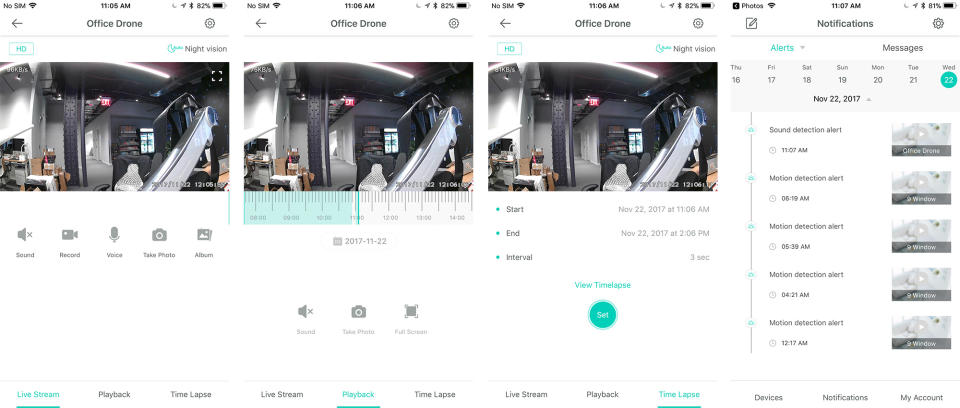Surprise: This $20 home monitoring camera actually doesn’t suck
You could set up five of these for the price of one Amazon Cloud Cam.
Most of the low-end connected cameras you'll find on store shelves will run you at least $50, and more feature-rich options like Amazon's Cloud Cam and Logitech's Circle 2 are north of $100. The prospect of kitting out your house with connected cameras doesn't need to be that expensive, though. On the opposite end of the price spectrum sits the WyzeCam, a super-cheap connected video camera ushered to market by — who else? — a handful of Amazon alums. Each camera will set you back a whopping $20, but don't let the price tag fool you: the WyzeCam is a surprisingly capable bargain.
At first glance, the WyzeCam doesn't look like much. It's a tiny white cube with a big black eye that swivels on a base, and the whole thing is so light you'd be forgiven for thinking it was a you. The WyzeCam might look a little familiar to fans of cheap, foreign gadgets, too, since it's actually based on another super-cheap camera system cooked up by a Chinese hardware maker and sold by Xiaomi. There have been plenty of cases where companies have rebranded existing products and sold them as their own, but this is a little different. Wyze Labs licensed the hardware, made some minor changes then built new, better software to power it.

That is Wyze's shtick in a nutshell. As director of marketing Jessie Zhou put it, the company's true value lies in "the ability to develop customer software for these products and sell them at an affordable price" rather than developing new hardware from scratch. "We consider hardware a commodity," she added. "Why reinvent the wheel?"
A future based on building new software for hardware that already exists seems fraught with potential problems, but that's the plan Wyze is sticking to for now. After a few weeks of testing, it seems the company might be onto something.
I set up two WyzeCams around the Engadget office: one was pointed at my desk to see if anyone alien wandered toward our growing pile of gadgets, and another pointed out the window to monitor the weather while I was futzing around in our studio. At $20 a pop, my expectations were basically subterranean. Despite their cheapness, though, the 1080p video feeds I tapped into from my phone looked surprisingly good — their wide, 110-degree field of view meant I could easily keep tabs on interlopers approaching Engadget's corner of the office and with better picture quality than I expected.

That a camera does a good job of capturing video shouldn't be a surprise, but considering the minimal cost involved, there's a lot to like here. The cameras pack a pair of infrared lights to help with night vision, along with a speaker and microphone to turn the camera into an intercom when needed. Ultimately though, the hardware is pretty rudimentary — what really shines is Wyze's software. Getting a WyzeCam up and running took just a few minutes, and after that, the company's no-nonsense app design made it easy to jump into live feeds, record footage and schedule time lapse recordings.
Even better, the WyzeCam records short videos whenever it detects sound or motion, and they're stored in the cloud for two weeks so you can easily go back and check them. (The total cost of that cloud storage: $0.) Since I installed my cameras at work, I got alerts basically all the time. At first, I thought that was exactly what I wanted, but when the notifications got to be too much, the app easily let me dial down the motion tracker's sensitivity. For now, I seem to have struck the right balance between "HEY, this stranger is getting to close to your stuff" and "Oh, Terrence just walked by again."

I admit it: I don't really need connected cameras in my life, so my uses for the WyzeCams have been pretty trivial. In a way, that's the beauty of the WyzeCam: it works better than expected, and since it's so cheap, you won't feel bad setting up a few just for kicks. What you probably shouldn't do, however, is rely on this thing to be a full-fledged security camera. That's definitely not what Wyze Labs had in mind when it put together the Wyze Cam, and it shows.
See, cheap hardware usually comes with a catch, and in this case there are a few. After about a week, the camera I pointed at my desk randomly disconnected from our WiFi network -- it just sat there playing its "hang on, I'm refreshing!" animation without ever saying it couldn't connect. I had to check the camera's settings to figure out what was happening, and that's just bad design. Having a camera decide to stop working correctly is mildly annoying when you're just trying to check the weather outside, but it could such a failure could be tragic under the right (or wrong) circumstances. And while the camera can be made to work like an intercom, it isn't particularly great at picking up what people were saying on the other end.
The other catch is more existential. Wyze Labs wouldn't confirm how much money it makes off of each camera, but Zhou admitted that margins were "extremely low" -- what else would you expect from something this cheap? The value is great for you and me, but carving out a niche as a purveyor of value-priced goods could make survival difficult in the long run. Then again, Wyze's philosophy is nothing if not practical — internet storefronts are full of cheap, solid Chinese cameras, and some software finesse is all it would take to make them palatable to the rest of the world now. And for now, the company's biggest problem is arguably a good one: it doesn't have enough supply to meet all of the demand.











